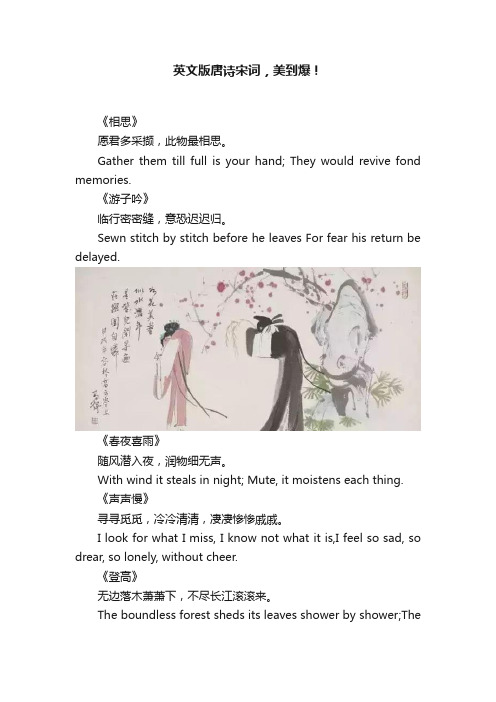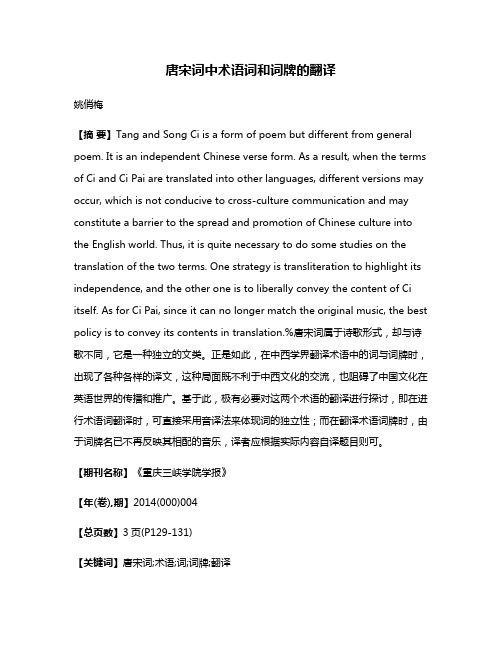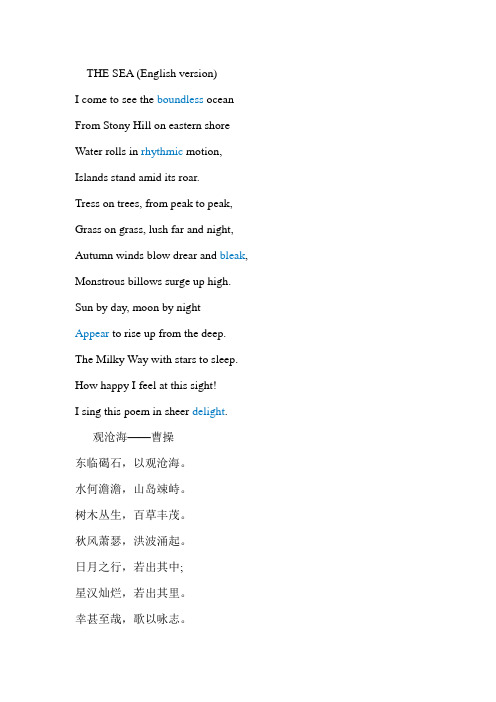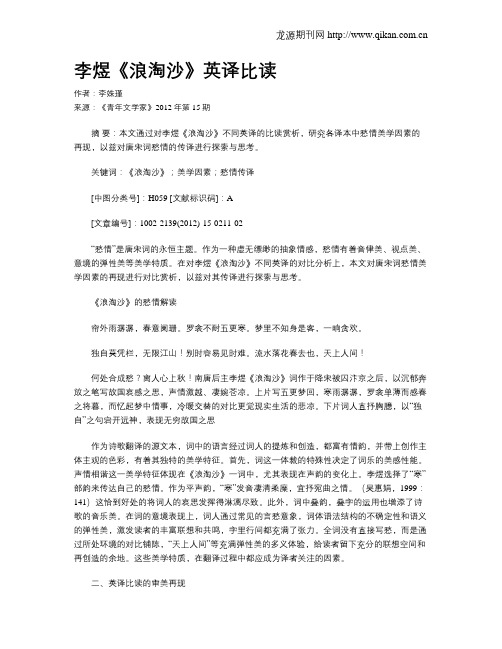李煜的浪淘沙英文版Tune
李煜《浪淘沙·帘外雨潺潺》全词翻译赏析

李煜《浪淘沙·帘外雨潺潺》全词翻译赏析李煜《浪淘沙·帘外雨潺潺》全词翻译赏析导读:据《西清诗话》谓此词是作者去世前不久所写:“南唐李后主归朝后,每怀江国,且念嫔妾散落,郁郁不自聊,尝作长短句云‘帘外雨潺潺……’含思凄惋,未几下世。
”从此词低沉悲怆的基调中,透露出这个亡国之君绵绵不尽的故土之思,可以说这是一支宛转凄苦的哀歌。
浪淘沙令李煜帘外雨潺潺②,春意阑珊③。
罗衾④不耐⑤五更寒。
梦里不知身是客⑥,一晌⑦贪欢⑧。
独自莫凭栏⑨,无限江山⑩,别时容易见时难。
流水落花春去也,天上人间。
注释①此词原为唐教坊曲,又名《浪淘沙令》、《卖花声》等。
唐人多用七言绝句入曲,南唐李煜始演为长短句。
双调,五十四字(宋人有稍作增减者),平韵,此调又由柳永、周邦彦演为长调《浪淘沙漫》,是别格。
②潺潺:形容雨声。
③阑珊:衰残。
一作“将阑”。
④罗衾(音qīn):绸被子。
⑤不耐:受不了。
一作“不暖”。
⑥身是客:指被拘汴京,形同囚徒。
⑦一晌(音shǎng):一会儿,片刻。
一作“饷”(音xiǎng)⑧贪欢:指贪恋梦境中的欢乐。
⑨凭栏:靠着栏杆。
⑩江山:指南唐河山。
句解:帘外雨潺潺春意阑珊罗衾不耐五更寒梦里不知身是客一晌贪欢这几句是说,帘外,雨下个不停,春天已经完了,但罗衾薄,寒气重,已感不支;在梦中竟不知已客居异地(作了俘虏),还以为像往日做帝王时一样,贪片刻的欢乐。
这几句词从当时难堪的生活感受,与不识趣的贪片刻欢乐的梦境对比中,引出失国的悲哀情绪和深长愁恨。
从对比中加深了词中所含蕴的意味,增强了感染力。
译文门帘外传来雨声潺潺,浓郁的春意又要凋残。
罗织的锦被受不住五更时的冷寒。
只有迷梦中忘掉自身是羁旅之客,才能享受片时的欢娱。
独自一人在太阳下山时在高楼上倚靠栏杆遥望远方,因为想到旧时拥有的无限江山,心中便会泛起无限伤感。
离别它是容易的,再要见到它就很艰难。
像流失的江水凋落的红花跟春天一起回去也,今昔对比,一是天上一是人间。
浪淘沙词牌名英语作文1000

浪淘沙词牌名英语作文1000## The Lyrical Elegance of Lang Taosha: Unveiling the Essence of a Timeless Chinese Ci Lyric.Amidst the vast tapestry of Chinese literature, the ci lyric genre stands as an exquisite form of poetic expression, known for its evocative language, intricate rhyme schemes, and melodic cadences. Within this rich landscape, the Lang Taosha詞牌名(cípái míng) emerges as a particularly captivating form, renowned for its versatility, emotional depth, and enduring legacy.### Origin and Etymology.The origins of the Lang Taosha name are shrouded in the mists of time, with various theories attempting to unravel its enigmatic genesis. One prevalent belief traces the name's etymology to a folk tune entitled "Lang Taosha," which served as the original musical accompaniment to the lyric's verses. Another theory suggests that the namealludes to a particular type of dance or performance associated with the song.### Structural Characteristics.The Lang Taosha lyric adheres to a strict formal structure, consisting of two stanzas of seven lines each, followed by a concluding stanza of five lines. The rhyme scheme is highly intricate, employing a specific pattern of alternating and interlocking rhymes. The first and fourth lines of each stanza rhyme, as do the second and fifth, the third and sixth, and the seventh lines of both stanzas. The concluding stanza follows a different rhyme scheme, with the first, second, and fourth lines rhyming, and the third and fifth lines forming a couplet.### Thematic Range and Emotional Expression.The Lang Taosha lyric delves into a wide spectrum of themes, encompassing love, longing, nostalgia, the transience of life, and the beauty of nature. Its verses often capture fleeting moments of emotion and experience,evoking a profound sense of resonance with readers across time and culture. The lyric's characteristic tone is one of poignant melancholy, tinged with a longing for what has passed or a yearning for what is unattainable.### Notable Practitioners and Masterpieces.Throughout the centuries, countless poets have graced the Lang Taosha form with their lyrical brilliance. Among the most celebrated practitioners are:Su Shi (1037-1101): The renowned Song dynasty poet penned several enduring Lang Taosha lyrics, including "Nian Nu Jiao · Chibi Huai Gu," a masterpiece that reflects on the futility of war and the inexorable passage of time.Xin Qiji (1140-1207): A prominent figure of the Southern Song dynasty, Xin Qiji infused the Lang Taosha lyric with a patriotic fervor, as exemplified in hisstirring "Shui Tiao Ge Tou · Jingkou Beiguting Huai Gu," which laments the loss of northern China to the Jurchens.Li Qingzhao (1084-1151): The trailblazing female poetof the Song dynasty left an indelible mark on the Lang Taosha form. Her lyrics, such as "Yujia Ao · Sheng Sheng Man," are celebrated for their poignant expressions of love, longing, and resilience.### Influence and Legacy.The Lang Taosha lyric has exerted a profound influence on Chinese literature and culture. Its distinctivestructural features and emotional depth have inspired countless poets and writers, and its verses have been adapted into numerous songs, operas, and other forms of artistic expression. Today, the Lang Taosha remains a beloved and enduring form, its lyrical melodies andtimeless themes continuing to resonate with audiencesaround the world.### Conclusion.The Lang Taosha詞牌名 stands as a testament to the enduring power and artistry of Chinese ci lyrics. Itsintricate structure, evocative rhymes, and profound emotional depth have captivated readers for centuries, inspiring countless poets and writers to explore the depths of human experience through verse. As a living testament to the beauty and complexity of the Chinese language, the Lang Taosha lyric continues to enchant and inspire generations, preserving a rich cultural heritage for posterity.。
英文版的中国古诗词摘抄唯美欣赏

英文版的中国古诗词摘抄唯美欣赏东西方文化发展存在错位现象,英美现代诗具有与中国古典诗歌在美学和语法上“汇通”的特征。
下面店铺整理了英文版的中国古诗词给大家,希望大家喜欢!英文版的中国古诗词篇一陆游---《示儿》死去原知万事空,但悲不见九州同。
王师北定中原日,家祭毋忘告乃翁。
To My Son(The Last Poem)Lu YouThat after death everythingBecomes void, I sure perceive;Yet, not to have seen my country unified is still what makes me grieve.When the King’s northward-bound ArmyThe Central Plains does reacquire,In your ancestral sacrificesForget not tell your sire!英文版的中国古诗词篇二陆游---《十一月四日风雨大作》僵卧孤村不自哀,尚思为国戍轮台。
夜阑卧听风吹雨,铁马冰河入梦来。
Written in a StormLu YouA bed, motionless, in a lonely village,For myself I sorrow not.All I seek's defence of my country's frontier,And to me a station there allot.Lying in the depth of the night I listenTo the winds blowing the rain,And iron-clad horses o'er frozen rivers,As of old, invade my dreams again.英文版的中国古诗词篇三《望月怀远》张九龄海上生明月,天涯共此时。
英文版唐诗宋词,美到爆!

英文版唐诗宋词,美到爆!《相思》愿君多采撷,此物最相思。
Gather them till full is your hand; They would revive fond memories.《游子吟》临行密密缝,意恐迟迟归。
Sewn stitch by stitch before he leaves For fear his return be delayed.《春夜喜雨》随风潜入夜,润物细无声。
With wind it steals in night; Mute, it moistens each thing.《声声慢》寻寻觅觅,冷冷清清,凄凄惨惨戚戚。
I look for what I miss, I know not what it is,I feel so sad, so drear, so lonely, without cheer.《登高》无边落木萧萧下,不尽长江滚滚来。
The boundless forest sheds its leaves shower by shower;Theendless river rolls its waves hour after hour.《鹊桥仙》两情若是久长时,又岂在朝朝暮暮!If love between both sides can last for aye,Why need they stay together night and day?《牡丹亭》情不知所起,一往而深。
Love once begun, will never end.《浪淘沙令·帘外雨潺潺》流水落花春去也,天上人间。
With flowers fallen on the waves spring s gone away,So has the paradise of yesterday.《江雪》千山鸟飞绝,万径人踪灭。
孤舟蓑笠翁,独钓寒江雪。
From hill to hill no bird in flight;From path to path no man in sight.A lonely fisherman afloat,Is fishing snow in lonely boat.。
唐宋词中术语词和词牌的翻译

唐宋词中术语词和词牌的翻译姚俏梅【摘要】Tang and Song Ci is a form of poem but different from general poem. It is an independent Chinese verse form. As a result, when the terms of Ci and Ci Pai are translated into other languages, different versions may occur, which is not conducive to cross-culture communication and may constitute a barrier to the spread and promotion of Chinese culture into the English world. Thus, it is quite necessary to do some studies on the translation of the two terms. One strategy is transliteration to highlight its independence, and the other one is to liberally convey the content of Ci itself. As for Ci Pai, since it can no longer match the original music, the best policy is to convey its contents in translation.%唐宋词属于诗歌形式,却与诗歌不同,它是一种独立的文类。
正是如此,在中西学界翻译术语中的词与词牌时,出现了各种各样的译文,这种局面既不利于中西文化的交流,也阻碍了中国文化在英语世界的传播和推广。
生态翻译视角下李煜《浪淘沙》译文比读-精选资料

生态翻译视角下李煜《浪淘沙》译文比读胡庚申教授于2004 年出版专著《翻译适应选择论》,将达尔文“适应/ 选择”学说与翻译相结合,提出了生态翻译学的翻译理论,促使这种以“译者为中心”的翻译理念成为一种新的翻译模式,为翻译提供了参考价值。
本文对比《浪淘沙》两个英译本,探讨生态翻译美学。
中国古诗词的生态意境中国古典诗词以其凝练隽永、意境深远而独树一帜。
品读中国古典诗词时我们发现诗词作者对大自然情有独钟。
他们笔下的诗词仿佛都能勾勒出一幅意境美图。
诗词中无不折射作者对大自然的向往和赞美之情。
中国古诗词体现的生态理念和智慧值得我们学习和借鉴。
二、《浪淘沙》背景介绍李煜( 937-978 ),五代十国时期南唐后主,著名词人。
他政治上虽庸驽无能,却有多方面的艺术才能,词的造诣尤高。
前期享乐,后被宋国俘获成为阶下囚惨遭毒害。
《浪淘沙》一词是李煜被掳至汴京软禁时所作,表达了惨痛欲绝的国破家亡情感,词的格调悲壮,意境深远。
词文如下:《浪淘沙》窗外雨潺潺,春意阑珊。
罗衾不耐五更寒。
梦里不知身是客,一晌贪欢。
独自莫凭栏,无限江山,别时容易见时难。
流水落花春去也,天上人间。
三、从“三维”适应性转换解读《浪淘沙》译例生态翻译理论借鉴生态学的研究成果对翻译现象进行重新阐释。
下面分别从语言维、文化维和交际维来分析该词的译本。
一)语言维角度解读该维度要求译者在翻译过程要注重语言形式的适应。
李煜浪淘沙》在翻译过程中,难免会出现词语、句子的意思丢失或者不能被英译出的现象。
本文将对徐忠杰、许渊冲两个英译本进行对比,分析词汇选择和音律美感。
Version 1 :Lang Tao ShaOutside the window ,rain seems to moan and sing.This year ,slow and weak is the return of spring.I feel badly chilled in the small hours of mornSilk bed-clothes prove useless against a cold dawn.In my dreams ,I forgot my status asguest ' Of relief for a moment ,I was inquest.Alone ,I wouldn 't rest ,on a rail ,my hand,To scan what was once my limitless land.Easy to leave one 's hearth and come to this nookHard to get back to one 's home to have a look.Flowing water never returns to its sourceMy country 's and mine is a hopeless lost cause.Fallen flowers cannot go back to their stockChips off the mass revert not to the block.One 's spring and youth has passed never to return.One 's destiny is not of Heaven Zhongjie )徐译文第三四行, 运用重复加解释的方式来解读“罗衾不耐性原则。
古诗词英文版

THE SEA (English version)I come to see the boundless ocean From Stony Hill on eastern shore Water rolls in rhythmic motion, Islands stand amid its roar.Tress on trees, from peak to peak, Grass on grass, lush far and night, Autumn winds blow drear and bleak, Monstrous billows surge up high. Sun by day, moon by nightAppear to rise up from the deep. The Milky Way with stars to sleep. How happy I feel at this sight!I sing this poem in sheer delight.观沧海——曹操东临碣石,以观沧海。
水何澹澹,山岛竦峙。
树木丛生,百草丰茂。
秋风萧瑟,洪波涌起。
日月之行,若出其中;星汉灿烂,若出其里。
幸甚至哉,歌以咏志。
古诗词英文版1. 但愿人长久,千里共婵娟。
We wish each other a long life so as to share the beauty of this graceful moonlight, even though miles apart.2. 独在异乡为异客,每逢佳节倍思亲。
A lonely stranger in a strange land I am cast, I miss my family all the more on every festive day.3. 大江东去,浪淘尽,千古风流人物。
The endless river eastward flows; with its huge waves are gone all those gallant heroes of bygone years.4.二人同心,其利断金。
李煜《浪淘沙》英译比读

李煜《浪淘沙》英译比读作者:李姝瑾来源:《青年文学家》2012年第15期摘要:本文通过对李煜《浪淘沙》不同英译的比读赏析,研究各译本中愁情美学因素的再现,以兹对唐宋词愁情的传译进行探索与思考。
关键词:《浪淘沙》;美学因素;愁情传译[中图分类号]:H059 [文献标识码]:A[文章编号]:1002-2139(2012)-15-0211-02“愁情”是唐宋词的永恒主题。
作为一种虚无缥缈的抽象情感,愁情有着音律美、视点美、意境的弹性美等美学特质。
在对李煜《浪淘沙》不同英译的对比分析上,本文对唐宋词愁情美学因素的再现进行对比赏析,以兹对其传译进行探索与思考。
《浪淘沙》的愁情解读帘外雨潺潺,春意阑珊。
罗衾不耐五更寒。
梦里不知身是客,一晌贪欢。
独自莫凭栏,无限江山!别时容易见时难。
流水落花春去也,天上人间!何处合成愁?离人心上秋!南唐后主李煜《浪淘沙》词作于降宋被囚汴京之后,以沉郁奔放之笔写故国哀感之思,声情激越、凄婉苍凉。
上片写五更梦回,寒雨潺潺,罗衾单薄而感春之将暮,而忆起梦中情事,冷暖交替的对比更觉现实生活的悲凉。
下片词人直抒胸臆,以“独自”之句宕开远神,表现无穷故国之思作为诗歌翻译的源文本,词中的语言经过词人的提炼和创造,都富有情韵,并带上创作主体主观的色彩,有着其独特的美学特征。
首先,词这一体裁的特殊性决定了词乐的美感性能。
声情相谐这一美学特征体现在《浪淘沙》一词中,尤其表现在声韵的变化上。
李煜选择了“寒”部韵来传达自己的愁情。
作为平声韵,“寒”发音凄清柔糜,宜抒宛曲之情。
(吴惠娟,1999:141)这恰到好处的将词人的哀思发挥得淋漓尽致。
此外,词中叠韵,叠字的运用也增添了诗歌的音乐美。
在词的意境表现上,词人通过常见的言愁意象,词体语法结构的不确定性和语义的弹性美,激发读者的丰富联想和共鸣,字里行间都充满了张力。
全词没有直接写愁,而是通过所处环境的对比铺陈,“天上人间”等充满弹性美的多义体验,给读者留下充分的联想空间和再创造的余地。
